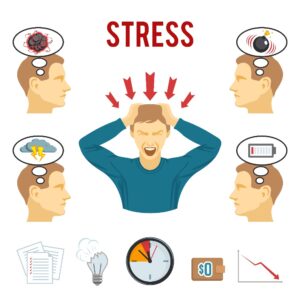From stress has become an integral part of our fast-paced lives, often considered inevitable. A seemingly unexplained headache, constant fatigue even after a long sleep, or a disturbing feeling of anxiety that you can't even name - these are just a few of the signs of stress that almost everyone has experienced at some point. It is the silent epidemic of modern society, which creeps into our lives at work, at school, and within the walls of our homes, often affecting our mental and physical health more than we realize.
But what is stress really? Is it always bad, or can short-term tension be beneficial? How do you recognize when normal worry becomes a chronic burden that starts to undermine our quality of life? And most importantly, how do you combat stress and regain control over your well-being?
TABLE OF CONTENTS
What is stress?
Symptoms of stress
Different places and causes of stress
Stress relief and management
Quick and practical techniques for managing stress
Long-term strategies for reducing stress
What is stress?
Stress can be simply defined as the feeling of worry or mental tension caused by a difficult situation. In essence, it is a survival mechanism, also known as the “fight or flight” response. It is a biological and automatic process that drives us to deal with challenges and threats in our lives. Everyone experiences stress to some extent, but how we respond to stress has a significant impact on our overall well-being.
Stress reaction
When our brain perceives a stressor—whether it’s a car suddenly braking in traffic, an upcoming exam, or a conflict with a boss—it signals the body to prepare for action. The adrenal glands release stress hormones into the bloodstream, mainly adrenaline and cortisolThey instantly raise your heart rate and blood pressure, sharpen your senses, and direct energy to your muscles and brain.
Good and bad stress – when does tension become a burden?
Although the word "stress“ is often used in a negative way in everyday language, it is important to understand that without it our lives would be unchanged – without stress there is no development. In the short term, this reaction is useful and even necessary. It is called eustress or "good stress", which gives us the necessary impetus to act and focus.
Problems begin when the stress response is not turned off. In today’s world, stressors are rarely one-time physical threats; rather, they are long-term mental concerns, such as a relentless workload, financial difficulties, or difficult relationships. When the body is in a constant state of alert, it cannot return to its normal resting state. Persistently high levels of stress hormones begin to damage our health: they deplete the immune system, disrupt sleep and digestion, and negatively affect mood.
Chronic stress and its hidden dangers
Stress becomes chronic when a stressful situation lasts for a long time or when stress reactions are repeated so often that the body and mind do not have time to recover. This constant state of alertness is not just an unpleasant feeling, but has profound and often hidden consequences. At the cellular level, prolonged stress can cause oxidative stress – a condition in which the body develops an imbalance between oxidative stressors and antioxidants. This process damages cells and is linked to premature aging and the risk of several chronic diseases.
In addition to physical damage, chronic stress and depression are closely linked. Constant exhaustion, feelings of hopelessness, and an inability to overcome stress can lead to depression as the body's and mind's resources are simply exhausted.
After an extremely traumatic event, a persistent state of stress may manifest itself post-traumatic stress disorder (PTSD), in which the body is in a constant state of “fight or flight” mode, causing constant anxiety and fear.
Symptoms of stress
 Because stress affects the entire body, its manifestations can be very diverse. Symptoms are individual, depending on the person and the type and duration of the stressors. Signs of stress however, early recognition is the first and most important step in dealing with the situation before it gets out of control.
Because stress affects the entire body, its manifestations can be very diverse. Symptoms are individual, depending on the person and the type and duration of the stressors. Signs of stress however, early recognition is the first and most important step in dealing with the situation before it gets out of control.
Symptoms of stress can be broadly divided into three categories: physical, mental/emotional, and behavioral.
Physical symptoms of stress
The body is often the first to show signs of excessive stress. Common physical symptoms include:
- Stress headache – often a dull, squeezing pain that feels like a whip around the head (tension headache).
- Muscle tension and pain, especially in the neck, shoulder and back areas.
- Digestive problems – stomach pain, nausea, diarrhea or constipation.
- Heart palpitations or rapid pulse.
- Insomnia and stress often go hand in hand – difficulty falling asleep, restless sleep, or waking up too early.
- Constant fatigue and lack of energy, even after adequate sleep.
- Decreased or increased appetite.
- Frequent illness, as stress can weaken the immune system.
Mental and emotional symptoms
Stress has a profound effect on our thinking and emotional lives. Common signs include:
- constant worry and anxiety;
- irritability, impatience and easy anger;
- difficulty concentrating and absent-mindedness;
- memory problems;
- difficulty making decisions;
- feeling overwhelmed;
- sadness, low mood, or a feeling of hopelessness.
Behavioral symptoms
Stress often changes our behavior. Danger signs can include:
- social isolation – withdrawal from friends and family;
- constant postponing or avoiding obligations;
- excessive use of alcohol, tobacco, or other substances to relieve tension;
- nervous habits, such as nail biting or foot tremors.
It is important to note that in the case of short-term stress, these symptoms are temporary and disappear when the stressful situation is resolved. However, if chronic stress, the symptoms are the same, but their duration is long-term and unrelenting. A temporary headache becomes a daily companion, worry develops into persistent anxiety, and fatigue becomes chronic exhaustion. Ignoring these persistent symptoms can lead to more serious health problems.
Different places and causes of stress
Stress triggers are stressors – events, situations or even thoughts that test us and require us to adapt. The causes of stress can be both external (for example, a heavy workload, a noisy environment) and internal (perfectionism, negative thinking, unrealistic expectations of ourselves).
They can also be divided by duration. Short-term stressors are, for example, a traffic jam or a public speaking engagement. They cause an acute stress reaction that usually resolves after the situation has passed. Long-term or chronic stressors, on the other hand, are constantly present in our lives, keeping the body and mind in a constant state of tension. These can include, for example, long-term unemployment, difficult family relationships or chronic illness.
School stress
For children and young people, School is one of the most common sources of stress. School stress is not due solely to academic workload, but is a complex combination several factors.
Today's school life has become extremely intense - long school days, lots of classes and short breaks leave little time for both mental recovery and physical exercise in the fresh air. Added to this is the constant academic pressure, the expectation of getting good grades, the incessant preparation for exams and tests, and the enormous amount of information that needs to be acquired in a short time.
Social and emotional stress plays an equally important role. The need to fit in, the fear of being rejected, the complexity of friendships and, unfortunately, often bullying at school can make school days emotionally draining. In addition, difficult relationships with teachers, where the student feels misunderstood or treated unfairly, can also be a source of stress.
This constant and multifaceted stress can lead to lack of motivation, anxiety, and even burnout or depression at an early age.
Work-related stress
Similar to school stress, there is also work-related stress a widespread problem in today's society that can lead to serious burnout. Work stress can be caused by too much workload, too short deadlines, or a constant feeling that the work will never end.
However, equally important stressors are psychological factors:
- bad working environment,
- conflicts with colleagues or superiors,
- little control over one's work tasks,
- unclear expectations,
- constant fear of losing your job,
- feeling that your contribution is not valued.
In the modern world, there is also the added pressure of being constantly available, where the boundaries between work and private life are blurring.
Other common sources of chronic stress
In addition to school and work, there are many other sources of long-term stress in our lives.
- Relationships and family life. Constant conflicts with a partner, divorce, worries about children, or the burden of caring for an elderly or sick family member are extremely emotionally draining.
- Financial worries. Constant worry about paying bills, debt, or income instability is one of the strongest causes of chronic stress because it is linked to our basic sense of security.
- Big life changes. Even positive events like getting married, having a child, or moving to a new place require a lot of adjustment and can be stressful. Not to mention negative events like losing a loved one or receiving a difficult diagnosis.
- Loneliness and social isolation. Feeling like you have no one to share your worries with or that you don't belong anywhere is a deeply depressing and stressful state.
Stress relief and management
 While stress is a part of life, we don’t have to be its passive victims. Coping with stress is a learned skill that can help us regain control over our well-being. Completely eliminating stress is not realistic, as it is an automatic physical process. However, we can learn how to manage our reactions and manage tension. Effective stress management involves both quick techniques to improve the current situation and long-term lifestyle changes that build mental resilience.
While stress is a part of life, we don’t have to be its passive victims. Coping with stress is a learned skill that can help us regain control over our well-being. Completely eliminating stress is not realistic, as it is an automatic physical process. However, we can learn how to manage our reactions and manage tension. Effective stress management involves both quick techniques to improve the current situation and long-term lifestyle changes that build mental resilience.
Quick and practical techniques for managing stress
If you feel a wave of stress starting to build over your head, there are simple techniques that can help calm your nervous system immediately.
- Deep breathing. This is one of the most powerful tools. Try the “4-7-8” method: breathe in through your nose for a count of four; hold your breath for a count of seven; and breathe out through your mouth for a count of eight. Repeat this a few times.
- A walk or workout, even a short one. Physical exercise, especially in the fresh air, helps to clarify thoughts and reduce tension in the body.
- A sensual momentary pause. Focus on your five senses. Name five things you see; four things you feel; three things you hear; two things you smell; and one thing you taste. This will bring you back to the present moment.
The common goal of all of these techniques is to interrupt the “fight or flight” cycle and activate the parasympathetic nervous system—the body’s natural calming and recovery system. This results in a slower heart rate, lower blood pressure, and a reduction in the production of stress hormones like adrenaline and cortisol. Essentially, you’re consciously telling your body to switch from alert to rest mode.
Long-term strategies for reducing stress
Managing stress in the short term can help you gain control over the current situation. However, the best way to combat stress is through prevention and consistency. Long-term habits help build a strong foundation that makes you more resilient to stressors.
Regular exercise
Physical activity is one of the most effective stress relievers. It helps produce endorphins (happiness hormones) and reduce stress hormone levels. Find an activity you enjoy, whether it's jogging, yoga, going to the gym, dancing, or just taking a daily walk.
Balanced diet and gut health
Food affects our mood more than we think. It’s worth paying special attention to how stress and blood sugar are linked. Fast carbohydrates and sugary foods cause rapid fluctuations in blood sugar levels, which can worsen anxiety and irritability. Choose stable energy sources like whole grains, protein, and healthy fats.
Recent studies also show a link between gut health and mental well-being – and so do probiotics and stress. Supporting a healthy gut microbiota can help reduce stress levels. However, it’s important to note that the effects of probiotics and fermented foods vary from person to person. It’s important to know that not all probiotics are right for everyone. Some strains of bacteria, especially those found in fermented foods, produce histamine, which can actually increase anxiety and stress symptoms in sensitive people. On the other hand, there are also specific probiotic strains that are neutral towards histamine or help It can even break it down, thereby supporting mental balance. Therefore, the choice of probiotics should be approached consciously and, if in doubt, consult a pharmacist or nutritionist.
Quality sleep
Stress and insomnia are a vicious cycle. Constant tension makes it difficult to fall asleep, and poor sleep reduces our ability to cope with stress. Create a regular sleep routine, avoid screens before bed, and make your bedroom a peaceful oasis.
Time for yourself
Consciously plan time for activities that bring you joy and help you recharge your batteries – whether it's reading, listening to music, a hobby, or simply being in silence.
Deal with the source of stress, not just the symptoms
While stress management techniques are important, the most effective long-term strategy is to address the root cause of your stress. This requires being honest with yourself and identifying the chronic stressors that are constantly draining your energy. You can't just accept stress.
- If work-related stress stems from a toxic work environment and conversations to improve the situation are not fruitful, changing jobs may be the best solution for your mental health in the long term.
- For persistent relationship problems, reaching out to a psychologist or family therapist can help you understand the dynamics and find a way forward – whether that's repairing the relationship or leaving it.
- In the case of school stress, relief can be provided by critically reviewing the study load, having an open conversation with the class teacher or school psychologist, and acquiring more effective time management skills.
By taking steps to reduce or eliminate sources of stress, you actively take back control of your well-being, instead of constantly dealing with the consequences.
When to consult a specialist?
Although it is possible to overcome many stressful situations on your own, there are times when your own strength is no longer enough. Seeking help is a sign of strength, not weakness. Seek help from a specialist (psychologist or family doctor) if:
- self-help techniques do not relieve stress and symptoms persist;
- stress starts to seriously interfere with your daily life: work, relationships, health;
- you feel persistent hopelessness, sadness, or have self-destructive thoughts.
Professional intervention is especially important for certain conditions. For example, treating post-traumatic stress disorder is a complex process that requires the help of a trained therapist. Specific treatments are used for such conditions, such as cognitive behavioral therapy or EMDR, which is not possible to implement independently. A specialist will help you find the most suitable solution for your situation and provide a safe environment in which to deal with your concerns.
From stress to balance
Stress is an inevitable part of our lives, but how we respond to it and what role we let it play in our lives is up to us. In this article, we have taken an in-depth journey through the complex world of stress – from its biological nature and symptoms to its main causes. We have seen that stress is not always the enemy, but when it becomes chronic, it can seriously damage our health.
The most important message, however, is that you don’t have to be a passive sufferer of stress. Whether it’s mindful breathing in the middle of a stressful day, changing your lifestyle to a balanced diet, or taking a bold step to address the real root cause of your stress – you have real and effective tools to improve your well-being. Don’t wait until the burden becomes too heavy.




